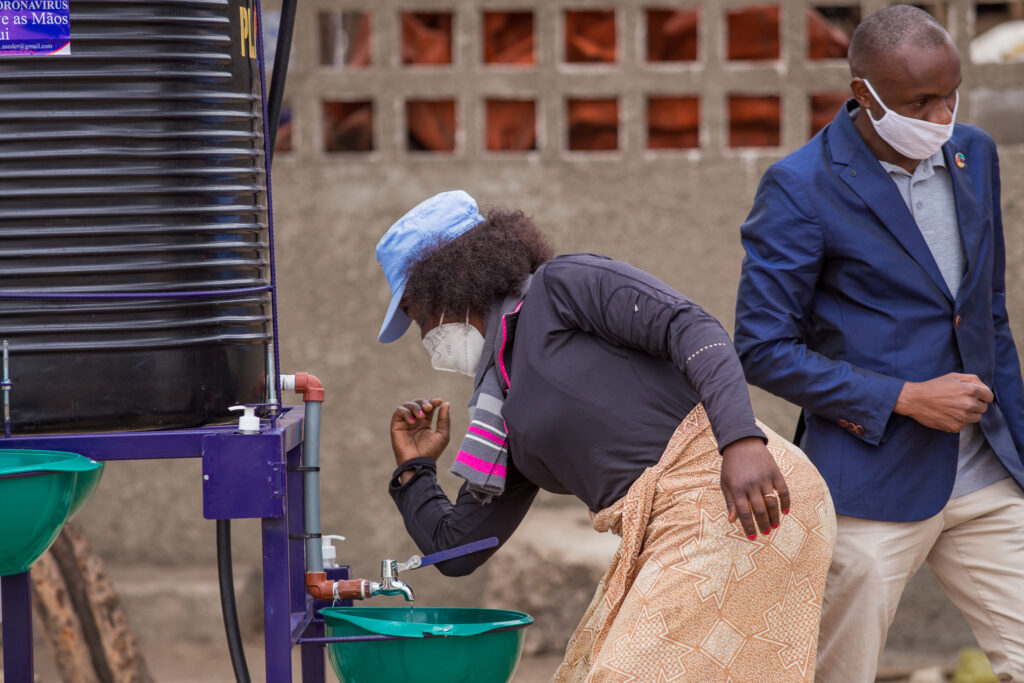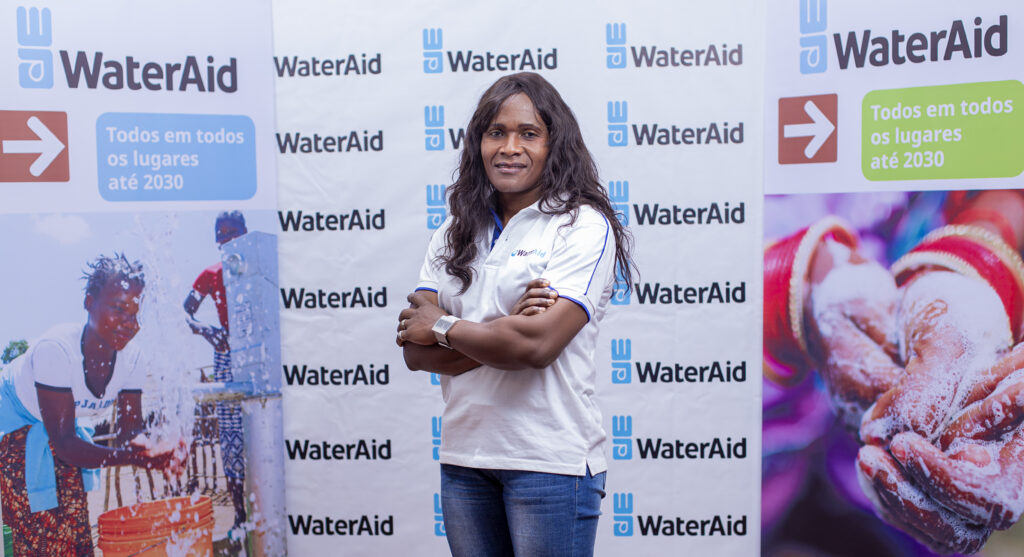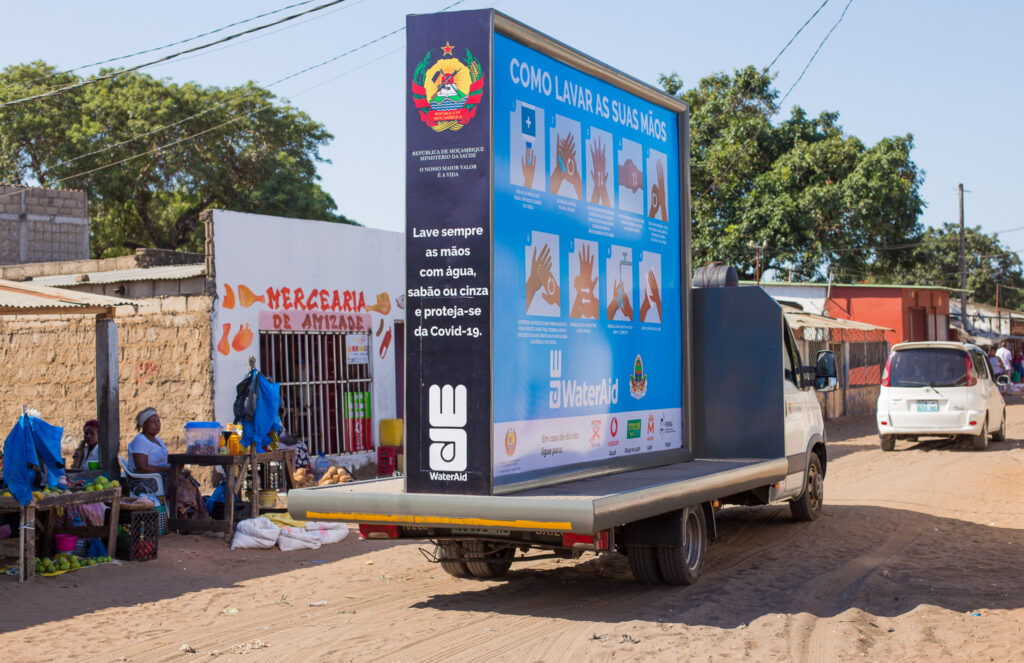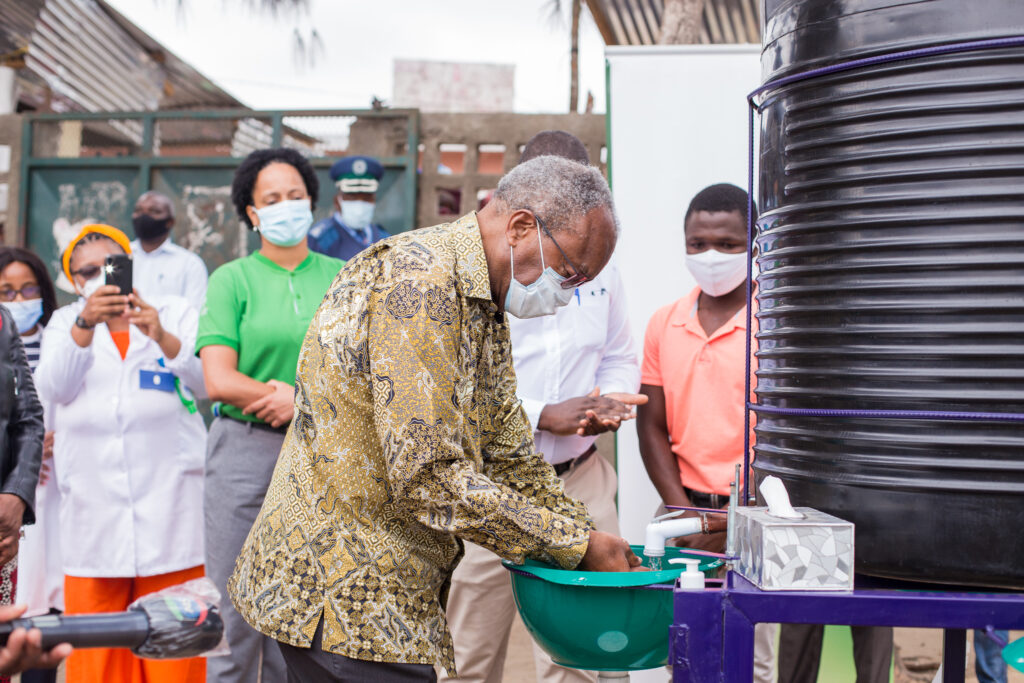By Arao José Valoi, WaterAid Mozambique
Hand washing is considered the first line of defence against the spread of Covid-19, but for people like Mariana Langa, 46, a salesperson at the Municipal Market of Zimpeto, in Maputo, access to water for handwashing is a dream. Mariana sells various products such as vegetables, potatoes, rice, pasta and more.

Mariana Langa washes her hands after her market was awarded with a handwashing station by WaterAid in partnership with the Municipality of Maputo. Photo: WaterAid/Signus
Like Mariana, other vendors in the market do not have access to water for hand washing, as the market lacks a tap or water supply. This is challenging, as Zimpeto is a busy location with frequent passing of goods and lots of people coming into close proximity.
Building hand washing stations
Although hand washing is considered a first line measure, access to water is still a huge challenge in Mozambique. Almost half of the population (46%) do not have access to clean water, 55% of households do not have a place to wash their hands with soap and water (Joint Monitoring Programme, 2015) and 27% of Health Centres in Mozambique do not have access to soap and water, according to SARA – Availability and Readiness of Services Assessment.
To reduce the spread of the Covid-19 pandemic, WaterAid partnered with key government stakeholders, including the Municipalities of Maputo and Nampula to ensure its programmatic intervention in markets, fairs and health centres which includes installation of hand washing stations in densely populated areas and distribution of soap and disinfectants. In total, 160 pedestal hand washing systems are being installed at 163 markets and 5 fairs in Maputo; 100 systems for 37 markets in Nampula and 130 systems for 20 health centres in the Memba and Mossuril districts, as well as Nampula province.
In Niassa, as well as ensuring access to water, sanitation and hygiene, WaterAid is rehabilitating and upgrading isolation centres for Covid-19 patients with the aim of providing access to water, sanitation and hygiene. WaterAid Mozambique has also recently carried out the distribution of hygiene and infection prevention kits to 16 health centres across each of the provincial districts. These include hand washing systems and cleaning materials.
Hygiene awareness campaign
WaterAid Mozambique, in partnership with the Government, launched a series of activities to disseminate messages on the importance of hand washing and hygiene. Utilising different strategies and platforms such as traditional media, digital platforms and well-known Mozambican influencers; musicians, TV presenters and sports stars like Olympic champion Maria de Lurdes Mutola, to raise awareness of the importance of hygiene in Covid-19 prevention.

Well-known Mozambican influencers; musicians, TV presenters and sports stars like Olympic champion Maria de Lurdes Mutola, help raise awareness of the importance of hygiene in Covid-19 prevention. Photo: WaterAid Mozambique
A mobile car carried key hygiene behaviour change messages displayed in Portuguese on the back, translated to native languages over megaphone and accompanied by a health technician to further discuss and legitimise the campaign messaging. After a month of touring 43 districts of Maputo Municipality, an estimated 840,000 people were reached with key hygiene behaviour change messaging. Many of these individuals would have been beyond the reach of digital campaigns.

Mobile Car circulating in the suburb areas of Maputo spreading Covid-19 preventive messages. Photo: WaterAid Mozambique.
This work has not been without its challenges, and WaterAid continues to adapt and innovate against the pandemic. The requirement for social distancing and unreliable internet connectivity in Mozambique has been challenging. Many materials including those for handwashing stations, personal protective equipment, and soap have been in short supply against demand across the country
WaterAid is now engaging the Ministry of Education on meeting the critical standards for WASH (WAter, Sanitation & Hygiene) in schools for their reopening, and we have aligned our strategy with sector leading guidance on how to safely do so during the pandemic. The pandemic has placed a renewed focus on the importance of WASH in educational settings and it is hoped this momentum can be continued after the reopening of schools in Mozambique to a nationwide conversation on the importance of WASH across society.
Article by Arao José Valoi, WaterAid Mozambique


